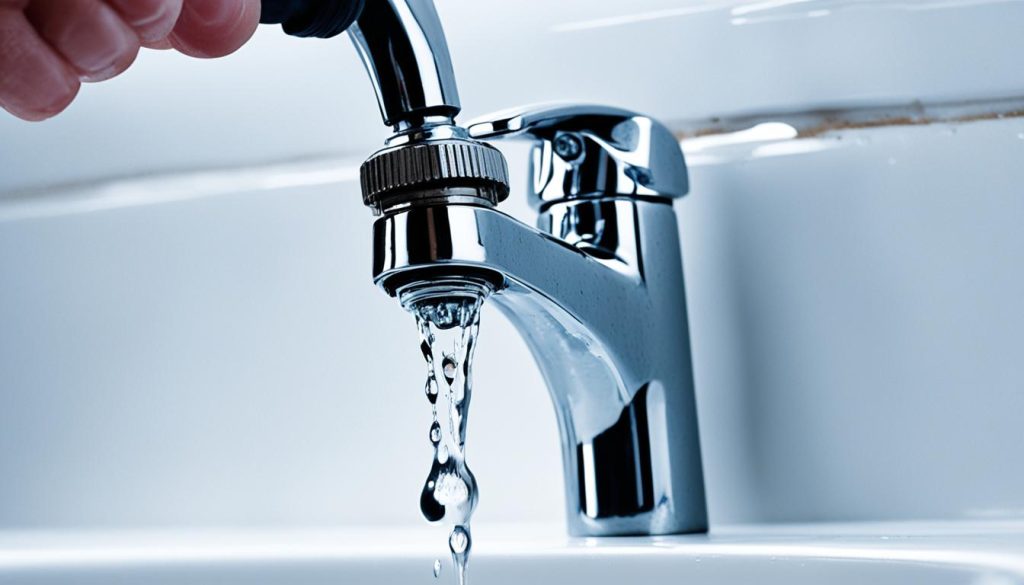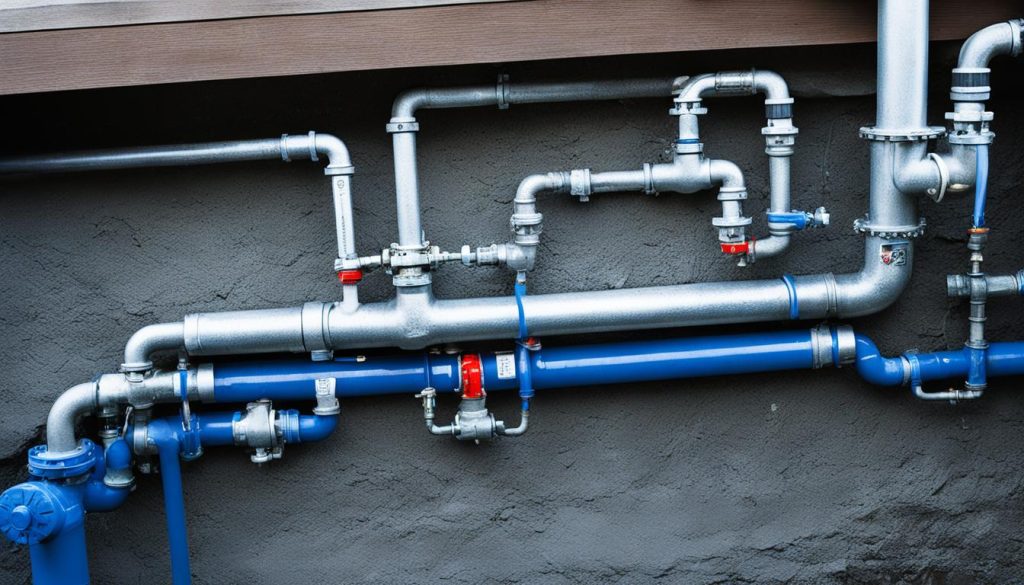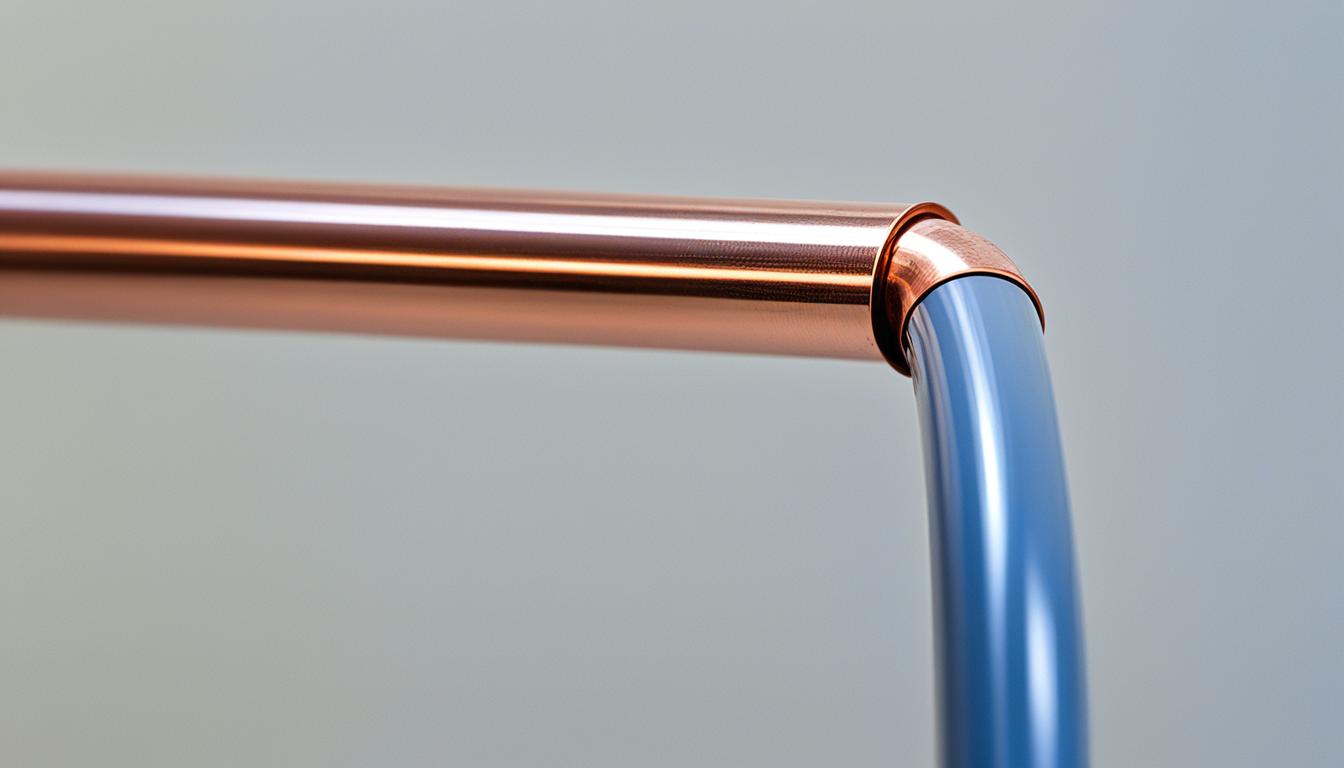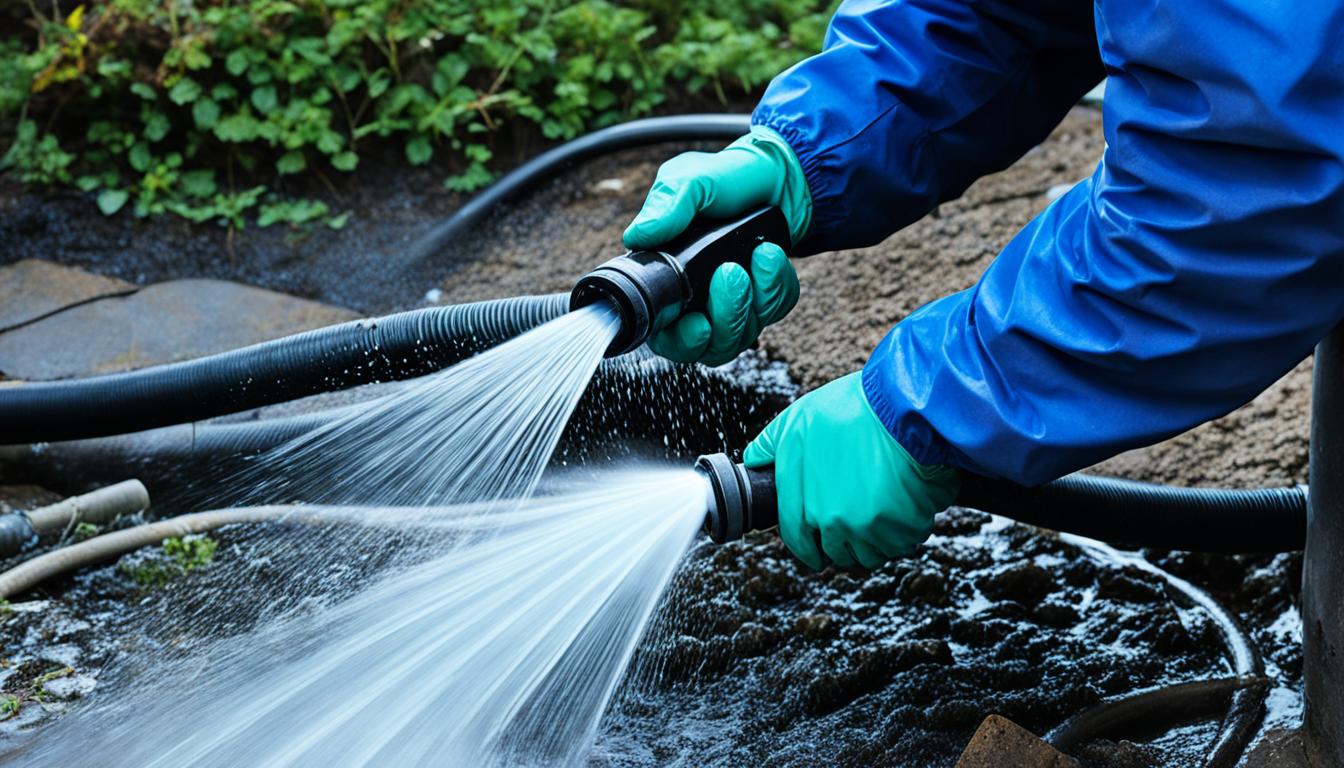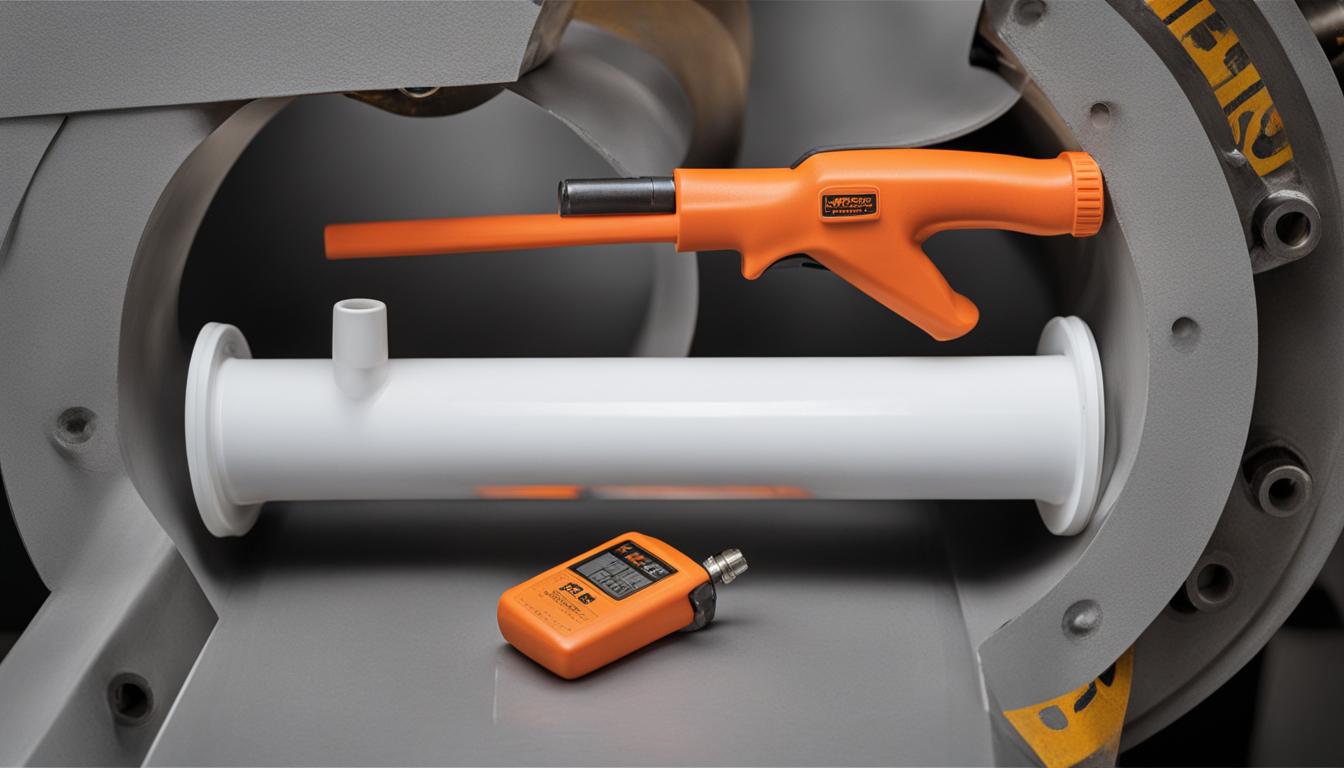Fixing Whistling Water Pipes Easily | Quick Guide
Did you know that whistling water pipes are a common problem in many households? The sound of a high-pitched whistle echoing through your plumbing can be incredibly annoying and disruptive, not to mention a sign that something may be wrong with your pipes. Whether you’re dealing with a slight whistle or a full-blown symphony of noises, it’s important to address this issue sooner rather than later.
In this quick guide, I will provide you with easy solutions to fix whistling water pipes and restore peace and quiet to your plumbing system. From identifying the cause of the noise to implementing practical fixes, you’ll learn everything you need to know to troubleshoot and resolve this pesky problem.
Key Takeaways:
- Whistling water pipes can be caused by high water pressure, loose pipes, and aging plumbing systems.
- Calling the water supply company or consulting with a licensed plumber can help diagnose and fix the problem.
- Knocking sounds may indicate a severe pressure build-up, which can be resolved by integrating noise softening devices or rerouting the pipes.
- Screeching noises can be attributed to faulty faucets, broken toilet fill valves, or drain blockages, and require professional attention to repair or replace.
- Water hammer, characterized by sudden pressure changes, can be mitigated through the installation of air chambers or surge arresters.
Whistling Pipe Noises: Causes and Solutions
If your water pipes are producing a whistling noise when the water is activated, this is often a sign of high water pressure. In such cases, it is recommended to call the water supply company to confirm the water pressure and have them install a water pressure valve to reduce the pressure.
If you have a well on your property, it is advisable to consult with a licensed plumber for a proper diagnosis and repair. They can evaluate the source of the noise and provide high-quality repairs, ensuring that the whistling noise is eliminated.
Dealing with whistling pipe noises requires the expertise of professionals to properly assess and fix the issue. By working with the water supply company and licensed plumbers, you can find optimal solutions for resolving the problem.
Addressing high water pressure is crucial in tackling whistling pipe noises. The installation of a water pressure valve by the water supply company can effectively reduce the pressure, eliminating the whistling noise. By contacting the water supply company, you can ensure that the appropriate measures are taken to regulate the water pressure in your home.
In cases where there is a well on your property, a licensed plumber can provide the expertise needed to diagnose and repair the whistling pipe issue. Their knowledge and experience enable them to identify the source of the noise and provide the necessary repairs, ensuring that the whistling noise is completely eliminated.
Don’t wait for the problem to escalate. Take action today and consult professionals who can provide the right solutions for your specific situation. By addressing high water pressure and seeking assistance from licensed plumbers, you can enjoy a quiet and efficient plumbing system in your home.
Knocking Sounds: Causes and Solutions
Knocking sounds in water pipes can be a frustrating and disruptive issue. These noises are often caused by a severe pressure build-up, which causes the pipes to move and knock into other surrounding materials. The result is a repetitive knocking or banging noise that can be quite bothersome.
To solve this problem, it is crucial to identify the source of the knocking and implement appropriate measures to decrease the pressure. A licensed plumber can assess the situation and recommend the best course of action based on factors such as the pressure points, age of the pipes, and water line configuration.
Eliminating Knocking Noises
One effective solution for reducing knocking pipe noises is to integrate a noise softening device with the water pipes. These devices are designed to absorb the shock and vibrations caused by the pressure build-up, thereby preventing the knocking sounds. Another option is to reroute the water pipes, creating a configuration that eliminates the knocking noises.
Let’s take a closer look at these two solutions:
- Noise Softening Device: A noise softening device, such as a water hammer arrestor, can be installed in the plumbing system to absorb the pressure fluctuations and eliminate the knocking sounds. These devices are typically installed near the source of the noise, such as the washing machine or dishwasher, to effectively mitigate the issue.
- Rerouting Water Pipes: In some cases, rerouting the water pipes may be necessary to completely eliminate the knocking noises. This solution involves changing the configuration of the pipes to eliminate areas of high pressure or unwanted pipe movement. Rerouting the pipes requires the expertise of a licensed plumber who can assess the plumbing system and recommend the most suitable modifications.
By implementing these solutions, homeowners can enjoy a quieter and more peaceful plumbing system, free from the disruptive knocking noises. Consulting with a professional plumber is recommended to ensure that the appropriate solution is chosen and implemented correctly.
Comparing Solutions for Knocking Pipe Noises
| Solution | Description | Benefits |
|---|---|---|
| Noise Softening Device | Integrating a noise softening device, such as a water hammer arrestor, into the plumbing system to absorb pressure fluctuations. |
|
| Rerouting Water Pipes | Changing the configuration of the water pipes to eliminate areas of high pressure or unwanted pipe movement. |
|
Installing a noise softening device or rerouting water pipes can effectively eliminate knocking pipe noises in your plumbing system. Consult with a licensed plumber to determine the best solution for your specific situation and enjoy a quieter and more peaceful home environment.
Screeching Noises: Causes and Solutions
If you hear screeching noises when using your plumbing system, it is essential to identify the underlying cause and take appropriate measures to resolve the issue promptly. Screeching sounds are often indicators of faulty faucets, broken toilet fill valves, or drain blockages. Addressing these problems in a timely manner can help prevent further damage to your plumbing system and ensure its smooth operation.
Faulty Faucets
One common cause of screeching noises in plumbing systems is faulty faucets. The screeching sound may occur when you turn on the water, indicating a problem with the internal parts of the faucet. To address this issue, it is recommended to call a reputable plumber to replace the faulty faucet. They can identify the specific parts that need replacement and install a new faucet to eliminate the screeching noise.
Broken Toilet Fill Valves
Another potential cause of screeching noises is a broken toilet fill valve. When you flush the toilet and hear strange noises, it may signify an issue with the fill valve. It is crucial to have a professional plumber assess the problem and recommend the appropriate repair or replacement. Ignoring the screeching noise can lead to more significant problems and potential water wastage.
Drain Blockages
Screeching noises in plumbing systems can also result from drain blockages. If there is a blockage in the drain pipes, the water flow may be restricted, leading to vibrations and screeching sounds. To resolve this issue, a thorough inspection of the drains is necessary. A licensed plumber can use specialized tools to remove the blockage and restore proper water flow, eliminating the screeching noises.
When dealing with screeching noises in your plumbing system, it is crucial to hire a reputable plumber who has the expertise to diagnose and resolve the issues effectively. Prompt action and professional assistance can help ensure the longevity and efficient functioning of your plumbing system.
| Solution | Description |
|---|---|
| Faucet Replacement | Call a reputable plumber to replace the faulty faucet with a new one, addressing the screeching noise issue. |
| Fill Valve Repair or Replacement | Consult a professional plumber to assess the problem and recommend repair or replacement of the broken toilet fill valve. |
| Drain Cleaning | Hire a licensed plumber to inspect and remove any blockages in the drains, restoring proper water flow. |
Diagnosing and Resolving Water Hammer
Water hammer is a common issue in plumbing systems that occurs when there is a sudden change of pressure. This typically happens when a faucet or valve closes quickly or if a valve is faulty. The sudden change of pressure can cause a variety of disruptive noises, such as banging, machine gun-like sounds, or even harmonic noises.
Severe water hammer can lead to pipe damage and it is important to address this issue promptly. One effective solution is the installation of an air chamber or surge arrester. These devices help absorb the shock waves and prevent the pipes from vibrating, reducing the noise caused by water hammer.
If you are experiencing water hammer in your plumbing system, it is best to consult with a licensed plumber. They will be able to assess the situation and recommend the appropriate solution for your specific case. Whether it is the installation of an air chamber or surge arrester, a professional plumber can ensure the proper functioning of your plumbing system and eliminate the disruptive noise caused by water hammer.
Remember, addressing water hammer is crucial not only for a quiet and peaceful environment but also to prevent potential damage to your pipes.
| Benefits of Air Chamber and Surge Arrester |
|---|
| Prevents pipe damage |
| Absorbs shock waves |
| Reduces noise |
| Preserves plumbing system integrity |
Maintenance Tips and Prevention
Regular maintenance of your plumbing system is essential to prevent issues like whistling water pipes. By following these simple maintenance tips, you can keep your plumbing system in optimal condition and avoid disruptive pipe noises.
1. Regular Washer Replacement
To prevent loose nuts and old washers from contributing to unpleasant sounds, it is important to replace washers in faucets every few years. This simple task can help maintain a proper seal and prevent leaks, reducing the likelihood of whistling noises.
2. Plumbing System Maintenance
Regularly inspect your plumbing system for any signs of damage or wear. Look for leaks, corrosion, or loose connections. Addressing these issues early on can prevent more significant problems down the line, including whistling pipes. If you notice any issues, it’s best to consult with a professional plumber for repairs.
3. Fill Valve Replacement
Fill valves in toilets can sometimes become faulty, leading to harmonic noises. If you hear unusual sounds when flushing the toilet, it’s a good idea to replace the fill valve. This simple replacement can help eliminate the noise and restore quiet operation to your plumbing system.
4. Proper Lubrication
When removing old valves, it’s important to lubricate the threads with WD-40 or a similar lubricant. This helps prevent damage to porcelain toilet tanks and ensures smooth operation of the valves. Be sure to follow manufacturer guidelines for lubrication and use only products recommended for plumbing applications.
By implementing these maintenance tips and taking proactive measures, you can reduce the likelihood of experiencing whistling or other disruptive pipe noises in your plumbing system. Regular maintenance is key to keeping your plumbing system running smoothly and quietly.
Conclusion
Dealing with whistling water pipes can be a real headache in any home. Luckily, this quick guide has provided you with practical tips and solutions to fix this annoying plumbing noise. Whether it’s high water pressure, loose pipes, or faulty valves causing the whistling, remember that seeking professional help is key to resolving the issue effectively. By taking the necessary steps and investing in regular maintenance and preventive measures, you can enjoy quiet and efficient plumbing, free from disruptive pipe noises.
When it comes to quieting water pipes and repairing plumbing noise, be sure to consult with licensed plumbers who can diagnose the problem accurately and provide reliable solutions. Their expertise and experience will ensure that your plumbing system functions smoothly and silently. Additionally, by regularly maintaining your plumbing system and addressing any issues promptly, you can prevent future pipe noises and enjoy a silent plumbing experience.
Say goodbye to noisy pipes and hello to a peaceful home environment. With the knowledge and solutions shared in this guide, you now have the tools to address whistling water pipes and restore tranquility to your space. Remember, a quiet and efficient plumbing system is within reach – just take the necessary steps to repair, maintain, and prevent those disruptive pipe noises. Enjoy the peace and serenity of a silent plumbing system today!
Source Links
- https://www.fenwickhomeservices.com/blog/how-to-fix-banging-and-whistling-water-pipes/
- https://dickray.com/why-are-my-water-pipes-whistling/
- https://www.inman.com/2004/12/08/unique-fix-whistling-water-pipes/
- Investing Wisely: How Windows & Doors in Boost Property Value and Financial Health - April 24, 2025
- The Financial Impact of Personal Injuries: Why Legal Help Matters for Business Owners - April 16, 2025
- The Hidden Financial Costs of Domestic Assault: What Business Owners Need to Know - April 16, 2025
